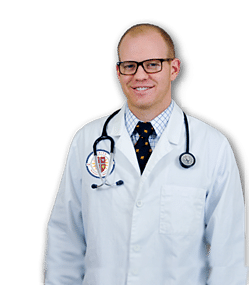
Trinity School of Medicine has always prided itself on the strength and ambition of its students. So many future physicians come our way looking for something new; whether that’s a unique learning environment built on support and a strong relationship with the faculty, a curriculum with an emphasis on clinical skills and service to patients, or just a true opportunity to live up to their potential.
In this next special edition of our alumni spotlight, meet Devon Charlton, MD, MPH. He’s a member of our inaugural class, and, as such, has a great perspective on Trinity’s own past, as well as insight for future students. Most recently, he has completed his residency and wrapped up his rheumatology fellowship and tenure as chief fellow at the University of Pittsburgh Medical Center. Later this month, he’ll be speaking at the annual American College of Rheumatology Conference.
Read on to hear from an excellent physician on his path from MIT to Trinity and beyond in this insightful, thoughtful interview!
Why medicine? What made you want to be a doctor in the first place?
Since I was young, I’d always wanted to be a physician, in particular, a surgeon. I found all that the field encompassed fascinating and I loved the few experiences of surgery I had observed growing up. However, during college I had tossed the medical pursuit aside, since I thought I was meant to go down the engineering path while at MIT. During my junior and senior years, the interest in medicine was rekindled. However, this was after delving into biomaterials and physiological sciences/research. During senior year, I was awarded a research internship in organ transplantation, which then transitioned into research in tissue engineering and orthopedics at another academic hospital in New York City. Finally, I ended up transferring into clinical research in rheumatology for a more hands-on patient experience prior to medical school. It was during those four years after college that I was convinced medicine fulfilled my altruistic and personal interests, and therefore was my calling.
Did you apply to any US schools? If so, what was the application cycle like for you?
I applied to several US schools twice (two cycles). I interviewed once at the University of Southern California, but was ultimately wait-listed. I had sub-par MCAT scores (27) [ed. that’s roughly a 502 on the current scale] and 3.0 GPA at MIT with average grades in pre-med courses – I was not actively pursuing pre-med at the time, but rather an materials engineering degree. While working at a renowned academic hospital doing research for ≈4 years, I tried to take additional classes and publish papers to make up for the bad grades during my undergraduate years. I had no guidance and I was too stubborn to seek adequate help. Therefore, I was quite delayed and poorly organized with regard to putting together a decent application. Ultimately, despite my excellent experiences and an ability to do well once I got into a medical school, the foundation I should have built made it very difficult to get into a US school.
What made you ultimately choose Trinity School of Medicine?
I wasn’t sure what else I could do at the time since I failed applying to US schools and my grants at work were up for renewal. I wanted to get started on a path to medicine rather than continue research, therefore, I found the advertisements for a Caribbean pathway. I felt the large schools would just be a circus where I would get lost in the cut-throat system. I researched my options and was intrigued by the smaller class sizes, guidance, etc. that would make up the experience Trinity offered. I admit, it still brought its own challenges with Trinity being a brand new international school.
How would you describe your experiences as one of Trinity’s first students?
What is your advice for incoming medical students?
Is there anything you’d like to say to current Trinity students?
Office of Admissions & Administration
Basic Science Campus, St. Vincent